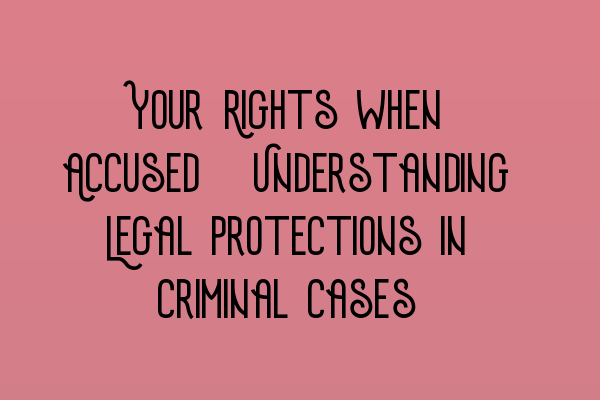Your Rights when Accused: Understanding Legal Protections in Criminal Cases
When you find yourself accused of a crime, it is crucial to understand your rights and the legal protections available to you. In criminal cases, the law ensures that all individuals are treated fairly and justly throughout the legal process. This article will provide an overview of the essential legal protections you should be aware of when facing criminal charges.
The Right to Legal Representation
One of the most fundamental rights you have when accused of a crime is the right to legal representation. It is highly advisable to seek the assistance of a qualified criminal defense solicitor who can advocate for your rights, analyze the evidence against you, and build a strong defense strategy on your behalf.
Click here to practice SQE 1 exam questions and assess your legal knowledge.
The Presumption of Innocence
Another important legal protection is the presumption of innocence. According to this principle, you are presumed innocent until proven guilty. The burden of proof lies with the prosecution, who must present evidence beyond a reasonable doubt to establish your guilt.
If you are preparing for the SQE exams, take advantage of the SQE 1 practice mocks FLK1 FLK2 to test your understanding of criminal law topics.
Protection Against Self-Incrimination
The right to remain silent and not incriminate oneself is another crucial protection in criminal cases. You have the right to refuse to answer questions from law enforcement or other authorities during an investigation or trial. It is advisable to seek legal advice before making any statements that could potentially be used against you.
The Right to a Fair Trial
Importantly, you have the right to a fair trial. This means that the court proceedings must be conducted impartially, and you have the opportunity to present your defense, cross-examine witnesses, and challenge the evidence presented against you. A fair trial ensures that justice is served, and proper legal procedures are followed.
If you are seeking preparation courses for the SQE exams, check out the comprehensive SQE 2 preparation courses available to help you succeed.
Protection Against Unreasonable Searches and Seizures
The Fourth Amendment of the UK Constitution protects individuals from unreasonable searches and seizures. This means that law enforcement must have a valid reason, supported by probable cause, to conduct searches or seize property. If your rights have been violated through an unlawful search or seizure, your defense solicitor can file a motion to suppress the evidence obtained.
Know Your Rights – Stay Informed
Being knowledgeable about your rights when accused of a crime is paramount to ensure a fair and just legal process. If you have any doubts or concerns, consult with a criminal defense solicitor who can provide you with professional guidance and protect your rights every step of the way.
For those preparing for the SQE exams, stay updated on important dates and exam information by visiting the SRA SQE Exam Dates page.
Remember, understanding your rights and legal protections can make a significant difference in the outcome of your criminal case. Seek professional legal advice and ensure that your rights are upheld throughout the entire legal process.
